At the risk of sounding like a broken record, Shoukoku no Altair has really hit its stride over these last couple of months. Way back when it started I had this ranked as co-headliner of the summer season with Made in Abyss, and while I’ve enjoyed it straight from the beginning, it didn’t necessarily seem as if Shoukoku would ever be contending for best show honors And while it didn’t in summer, autumn has proved a different beast – both because it has no obvious standout like Made in Abyss and because Shoukoku no Altair has become the series I expected it to right from the beginning.
While this is a story that took a while to fully engage, it makes up for that in rock-solid foundation. Big narratives like this one – continental military and political conflict, with a hero who has a fully realized character arc – require some setup time, by necessity. But patience is amply rewarded with Shoukoku no Altair, because there was a purpose behind all the steps that led us to this stage both in terms of the story and Mahmut’s personal journey. There are no shortcuts to get to the point we’ve reached now, but the pillars the story has built give Shoukoku a gravitas most other anime simply lack.
All along, there’s been an essential conflict when it comes to Mahmut – one which I think the likes of Halil and Zağanos could always perceive, and which contributed to Mahmut’s temporary fall from grace. For all his precocious brilliance and magnetism, Mahmut has always been pursuing a path which seemed destined to fail. Mahmut is aware of this too – we’ve certainly seen him buckle under the weight of it several times of late. Even as Louis was exercising his brilliance in preparing the Empire for war, Mahmut was honing his to try and forestall it. Even Halil – who, as Zağanos notes is a man clearly better suited to times of peace – knew war was probably unavoidable. But Mahmut was just young and idealistic enough to believe otherwise.
Well, that’s surely changed for Mahmut now – the sight of the Imperial army marching on Cielo with his surrogate father’s head on a spike will have seen to that. The way this chain of events played out was quite cogent and deftly portrayed. Carbajal’s gambit may have been a partial success, but the Tripartite Alliance was in such a weakened position relative to Balt-Rhein (on this battlefront anyway) that a partial victory wasn’t good enough. One always sensed that this game of cat and mouse between Halil Pasha and Pino was going to end badly for Turkiye, even if Halil had gotten the better of his rival thirteen years earlier.
Halil’s decision to run was probably a good one, given that the biggest advantage the Alliance forces had was the Empire’s lack of a supply line. Pino going after the expeditionary forces and their ample stores was inevitable, and even with a numerical advantage (26,000 to 22,000) it made more sense for the Pasha to try and avoid combat for as long as possible and starve Pino out. But one notable aspect of Shoukoku no Altair is that the antagonists here aren’t stupid – Pino is a good general, Louis is a brilliant strategist, and there are sharp men up and down the ranks of the military leadership.
Sharp men – and women, too, like Lily Kokoschka (Ise Mariya). It’s she who comes up with the gambit that allows the Empire’s army to catch up to Halil’s – she correctly predicts their movements based on the necessity of grasslands to feed their huge numbers of livestock and horses, and floats Pino’s army on rafts downriver to a position where she expects the Turkiye forces to arrive. Even then, in theory Halil should still have the advantage – he has more men, and the high ground. But as Jamie and Adam could tell you the high ground isn’t insurmountable, and Pino isn’t going to be fooled by the same tactics that bested him 13 years earlier.
One has to hand it to Louis – if one is bound and determined to dedicate themselves to war and conquest, he’s gone about it very intelligently. The creation of an engineering division was forward-thinking and brilliant, and directly led to Balt-Rhein’s win here. We’re never spared the reminders of how ruthless the Empire is (like their beheading of the captives from Halil’s army in full view of Cielo), but also given frequent reminders that they’re just as human as their enemies. Even Luis is shown to be rather jovial and kind with his page, Nicolo – almost to the extent that one imagines he sees the boy as a possible protege.
Now, the ball is truly in Mahmut’s court. All of his efforts have led to this – the war he’s tried to forestall is on his doorstep, he’s vastly outnumbered, and the person most dear to him has fallen on the battlefield. His tears on the battlements are an understandable reaction from someone who for all his authority is barely more than a child himself – Mahmut has lost more than anyone should ever be forced to lose. But childhood is truly over for him now – he has to stand up and become someone he doesn’t want to be in order to try and save his people and his country. That’s a terrible burden for anyone to bear, much less someone so young – but that’s been Mahmut’s destiny right from the first moments of the series.


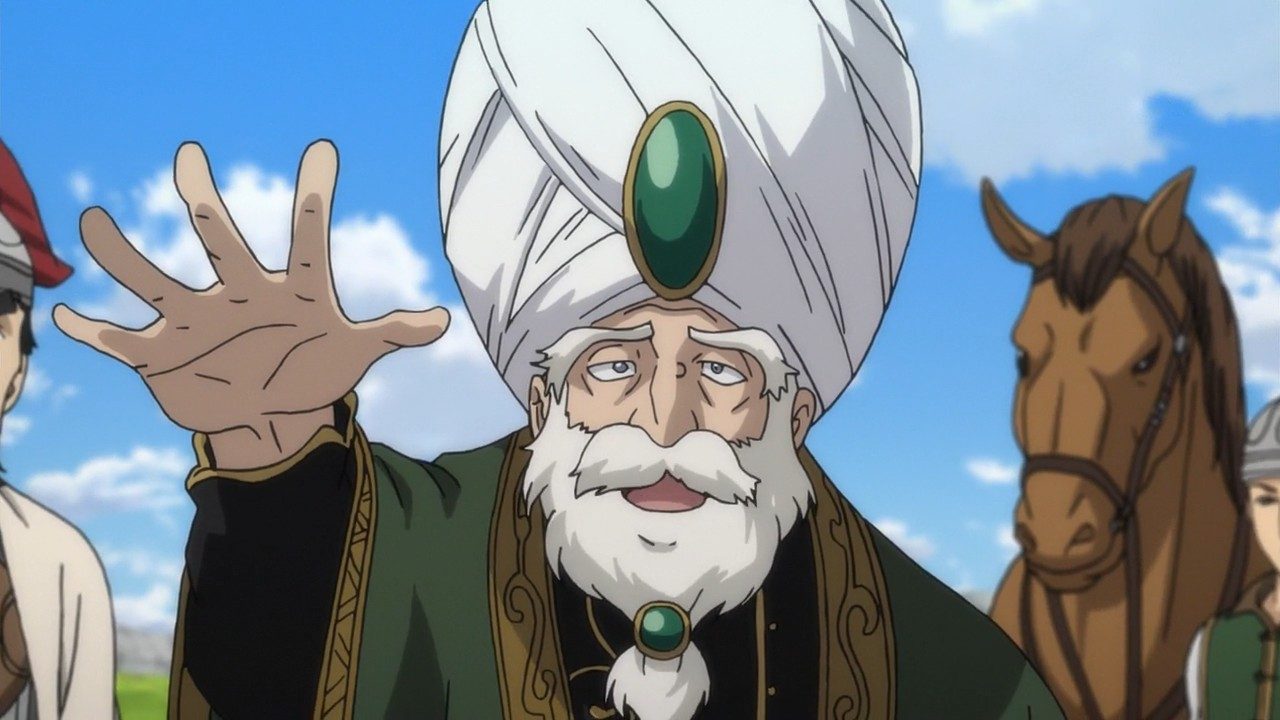


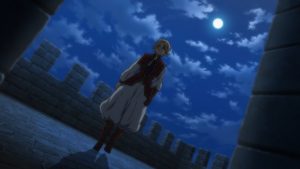
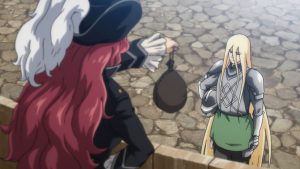

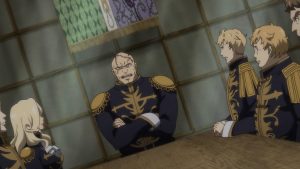

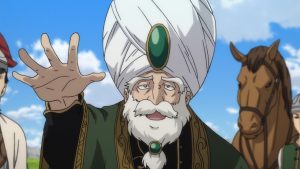
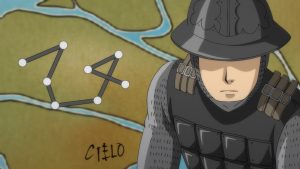


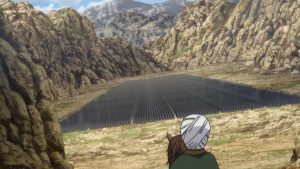

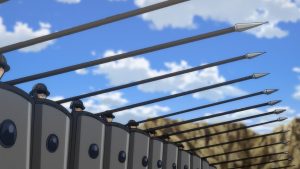
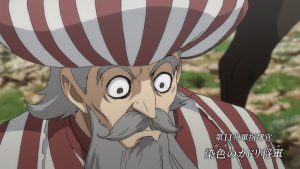
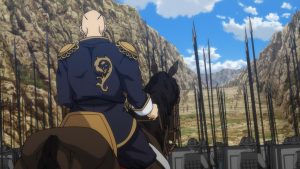

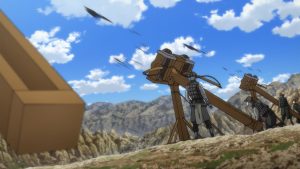
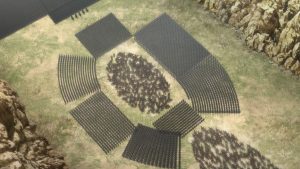
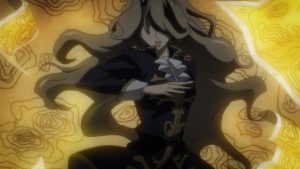
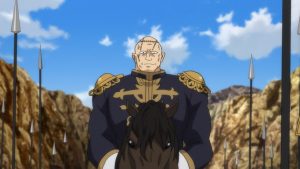

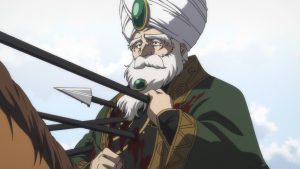



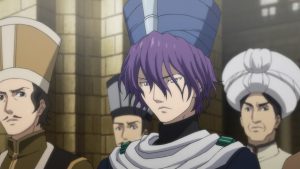
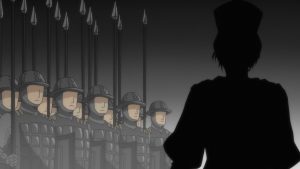




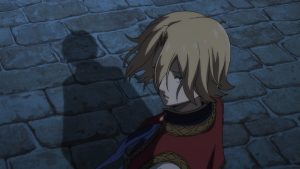


Earthlingzing
November 25, 2017 at 8:58 amI would say that the story peaked at the second half of the first cour, but the current arc isn’t bad either. Halil Pasha’s death was inevitable but it gave a nice glimpse into Balt-Rhein’s strengths, Mahmut’s battle against them should be pretty spectacular.